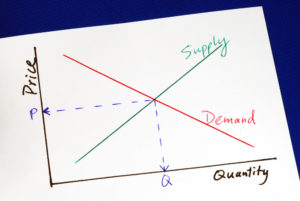A streetwise analyst does not expect the typical politician to profess a coherent economic theory. The summits reached by Vladimir Putin in this area would be a matter of analytical wonder if they did not also remind us of the lower peaks where our own political rulers stand–as well as of the poor level of general economic literacy. The readers of yesterday’s Financial Times got two good examples in a single story (“Vladimir Putin Threatens to Cut Oil Output After G7 Price Cap,” December 9, 2022).
Putin is quoted as saying:
If someone agrees at some point that the consumer determines the price, then the whole industry will collapse, because the consumer will always insist on a lower price.
Since the consumer always wants to pay the lowest possible price (“insists on a lower price”), one wonders why all industries don’t collapse.
Another pearl reported in the Financial Times story (paraphrasing and then quoting Putin):
If buyers do manage to get lower prices for oil, “prices will go down, investment will be reduced to zero, and in the end prices will go through the roof.”
This is what, in a previous EconLog post, I called the yo-yo economic model. A simple confusion between supply and quantity supplied, and between demand and quantity demanded, leads to this sort of reasoning: if demand decreases, prices will go down; if prices go down, demand will increase; if demand increases, prices with go up (“go through the roof”); and the cycle will repeat. “What goes up must go down.” The confusion is between a move along the demand or supply curve and a shift in the whole curve. (Incidentally, one advantage of a mathematical representation of supply and demand is that one sees that immediately.)

In defense of Mr. Putin in both cases, if we can call this a defense, he may have been speaking of the consumer or producer as a nation or country, for he cannot imagine anything else, even as an ideal, than a collective consumer and a collective producer. Run-of-the-mill protectionists fall in the same collectivist trap.


READER COMMENTS
Jon Murphy
Dec 10 2022 at 12:45pm
Goofy comments like Putin’s are why I always chuckle when someone says “economists must have missed something with their theory because Political Policy X is so popular among politicians!”
Jose Pablo
Dec 11 2022 at 12:40pm
Good comment Jon, but …
… if you take this with a pinch of salt and read it as:
“economists must have missed something with their theory because Political Policy X is so popular among PEOPLE/VOTERS!”
plus the fact that what economists try to explain is the economic behavior or people/voters
Then it could be possible that “economist must have missed something with their theory because, the policies they advocate as more appropriate are so unpopular among the people which collective behavior they try to apprehend in their models”
Granted, the alternatives,
a) “what people do prefer (as shown in their actual behavior) and what people say/think they prefer (as shown when they vote for their political representatives) is very different”
or
b) “People are just a bunch of morons”,
could also be true.
Unsettling
Jon Murphy
Dec 12 2022 at 7:55am
A) is party true. Talk is cheap after all. B) is a poor explanation. We don’t need to assume such things when we have more reasonable explanations.
Economists long have had explanations of why political policies deviate from economic ideals and why people may support things that harm them. Adam Smith wrote about it. We have two major fields of study on politics and economics.
My point is twofold: 1) just because a policy is popular doesn’t mean it’s working as intended and 2) Economists have studied these problems for centuries. We haven’t missed something; the person making the claim has.
There’s also a third point I could raise: just because some policy has been adopted doesn’t imply it’s popular. Indeed, many unpopular policies remain on the books.
Jim Glass
Dec 10 2022 at 3:09pm
Putin’s words showing Soviet-era KGB-level understanding of economics – about as astute as his mastery of Ukrainian history – are easy to mock. But as a qualifier, keep in mind that every word he says is aimed at the Russian domestic political audience. He’s speaking to them at their level. Whatever his propagandists calculate will impress them the way they want is what Putin will say — truth, reason, common sense, Putin-actually-believing-it, having nothing to do with it. (Perhaps politicians in democracies even sometimes act a little bit this way?)
By his actions Putin puts a very high value on sound (macro) economic policy and government finance. The Russian Central Bank and Ministry of Finance comprise the one part of his government deemed honest and fully capable by its western counterparts. The $600+ billion of foreign exchange reserves they had at the start of the war didn’t accumulate via incompetence and accident.
The president of the Russian Central Bank, Elvira Nabiullina, is highly regarded in the west. Reports say she’s resigned twice since the start of the war, but Putin won’t allow it because he deems her too valuable to let her go. Nobody else who’s quit on him over the war has gotten anything like such nice treatment.
MarkW
Dec 11 2022 at 6:58am
Perhaps politicians in democracies even sometimes act a little bit this way?
‘Sometimes’? ‘A little bit?’ I think you underestimate them. What a politician (here or there) says about economics is determined almost completely by what they think will resonate with their voters (and prospective voters). But as with Putin, they may try to quietly implement saner economic policies because they also know they can lose elections when the economy goes sideways. It’s a struggle, though.
Things work better, of course, during those eras when voter preferences and sound economic policies are in alignment. But we seem not to be in one of those eras, and haven’t been for years. At least not here in the US.
There’s a scene in the revived ‘All Things Great and Small’ where the old vet finished up the treatment of a horse with a combination of chemicals that creates a puff of purple smoke. The farmer is impressed and believes at that point that he’s gotten his money’s worth. There’s a enough purple smoke in political speech that you sometimes wonder if there’s anything else.
Putin is a deeply evil dictator, but is he dumber about Economics in his public pronouncements than Trump, Biden and most other high-level US politicians? If so, it’s not obvious to me. And even worse is when the politicians actually believe the bad ideas or feel compelled to implement and defend them to satisfy their voters.
Jon Murphy
Dec 11 2022 at 7:07am
I don’t know. His actions are just as foolish: starting a war and isolating Russia from major trading partners, attempting to use trade as a weapon and consequently pushing Germany and others more into the US’ orbit. From a longer-term perspective: there is massive brain drain, the Currency Crisis in the late 1990s, increased reliance on natural resources.
Jim Glass
Dec 15 2022 at 7:14pm
Did you ever see the movie Body Heat? In it Kathleen Turner’s character, Matty Walker, on-screen has a very passionate affair with Ned Racine (William Hurt) while off-screen framing him for a murder in a way that will let her get away to an exotic land with a gigolo and a zillion dollars.
I once saw Turner asked in an interview: “Did Matty really love Ned, or was she just playing him?” She answered: “Oh, Matty truly loved Ned — but love wasn’t her first priority.”
Craig
Dec 10 2022 at 6:30pm
I think he is responding to a price cap imposed by state actors, no? His point is that buyers don’t get to dictate the price, essentially, if you think about it, the price cap is essentially an offer of sorts. Russia could accept it, or not. Its up to them.
Pierre Lemieux
Dec 11 2022 at 10:57am
Craig: That’s a good point. But I think it can be subsumed under my more general point: Putin can only think in terms of collectives and “state actors” (or bilateral monopolies).
Mactoul
Dec 10 2022 at 7:36pm
I don’t see Putin is making any controversial statement. If the customer is going to determine the price, the price is going to be lower than the true price (which is determined by both the buyer and the seller)
Pierre Lemieux
Dec 11 2022 at 11:32am
Mactoul: You are right if what you mean is that if demanders form a (effective) cartel, they will set the price at marginal revenue=marginal cost, thus at a lower level. Then, the cartel (a monopsony) does set the price, through what it buys. Note however that the price thus set would still equal to (not lower than) the marginal cost (and the average variable cost) of the suppliers.
Perhaps, as Craig (and perhaps yourself) argued, Putin is only considering, and interested in, a situation where there are no competitive producers intent on maximizing profits and no individual consumers, but only state actors acting for political reasons. But then he should not try to give us lessons in simple economics. He should speak in terms of public-choice economics.
Philip B. Jaffa
Dec 11 2022 at 3:17pm
The level of corruption within Russia is astonishing. It is a society focused on stealing rather than producing. That, of course, exists within domestic markets. They are able to do this because they have natural resources to sell abroad which finance the lifestyles of the elites (which are a collection of criminal organizations). The invasion of Crimea in 2014 fundamentally shifted the focus of the regime from stealing to creating an empire. It is a Potemkin army supported by a Potemkin economy. Of course they don’t really understand economics. Between the cost of fighting a war and sanctions the money to support the lifestyles of the elites is disappearing. That they DO understand. I have it on good authority that Oligarchs are flying out the window, or killing themselves after murdering their families, so that there are fewer people for Putin to pay off (now that he has less money for the payoffs). Putin is said to personally approve assassination lists. There have to be plenty of potential Putin targets who would like to get Putin before they themselves are taken out.
Who needs to study econonics in a world like this?
Pierre Lemieux
Dec 12 2022 at 11:36am
Philip: Economics, which studies individual behavior and its consequences in a world of scarcity, does have a lot to say about violence. See my post “The Economics of Violence: A Short Introduction.” Indeed, many of your remarks illustrate that.
Jose Pablo
Dec 12 2022 at 9:36pm
“It is a society focused on stealing rather than producing”
In the US, around 45% of what individuals produce are stole by the government (at differente levels but stole it is anyway). In Europe the “steal” is even bigger.
And it is growing … and will, very likely, keep doing so even more in the future
Comments are closed.